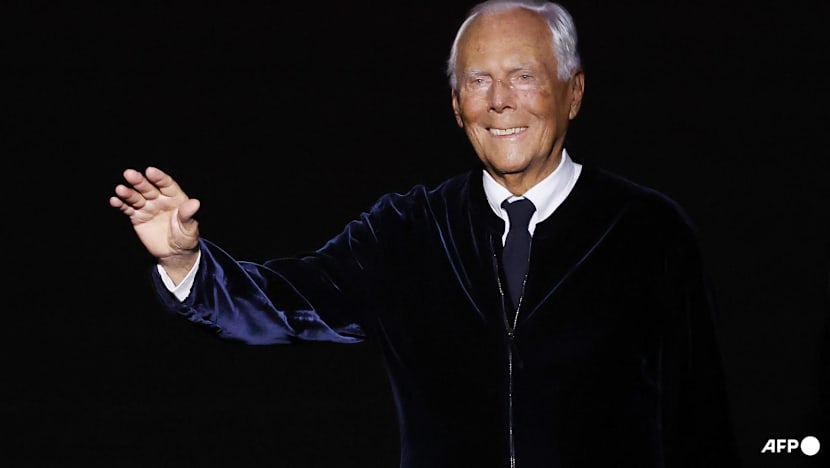Lifestyle
Giorgio Armani’s Legacy: A Shift in Ownership Awaits

The iconic Italian fashion designer, Giorgio Armani, has shifted his stance on the future of his luxury brand empire. Following his passing at the age of 91, Armani’s will, drafted in March and released on September 12, 2023, directs the Giorgio Armani Foundation to sell a stake in the company he founded in Milan over 50 years ago. This decision has sent shockwaves through the fashion industry, particularly as it includes two French luxury conglomerates among his preferred suitors.
Armani had long maintained his commitment to preserving his brand from foreign ownership. In 2016, he established a foundation specifically designed to protect his business from break-ups or takeovers. Yet, the revelation of his will marks a notable departure from that philosophy. The three potential buyers named in his will are LVMH, L’Oreal, and EssilorLuxottica, with the first two being French entities. The involvement of Bernard Arnault, the billionaire head of LVMH, raises the stakes in what could become a fierce competition for control of a fashion giant valued at an estimated €7 billion (approximately US$8.3 billion).
The announcement has elicited enthusiastic responses from the brands named in Armani’s will. L’Oreal, which has collaborated with Armani on a successful beauty line for nearly four decades, expressed gratitude for being considered a potential buyer. Similarly, EssilorLuxottica, an eyewear leader, expressed pride in the nomination, although insiders suggest that both companies may refrain from pursuing an outright purchase of the brand.
In contrast, LVMH stands out as a serious contender. Sources indicate that Arnault has long had an interest in acquiring Armani, viewing it as a valuable addition to his expansive portfolio. In his comments, Arnault stated he felt “honoured” to be named in the will and highlighted LVMH’s commitment to enhancing Armani’s global presence if a partnership were to materialize.
Notably, industry executives in Milan expressed surprise at Armani’s choice of LVMH, given his previous resistance to selling to French buyers. The 2023 documentary *Milano: The Inside Story of Italian Fashion* showcases Armani’s earlier assertions against a sale to such companies. An industry insider remarked, “It’s just unthinkable that only a few years later, out of all people, he mentioned Arnault as his preferred buyer.”
Armani’s will specifies that his heirs, including his close associate Leo Dell’Orco and family members, must also consider other prestigious groups with existing partnerships with the brand. The initial sale will involve a 15 percent stake within 18 months of his passing, with an additional 30-54.9 percent to be sold to the same buyer in three to five years. The Giorgio Armani Foundation, which includes Dell’Orco and other family members as stakeholders, will retain a minimum of 30 percent of the company.
For potential buyers, the allure of Armani’s lucrative licenses, particularly its successful beauty collaboration with L’Oreal, is significant. The Armani Prive fragrance line, introduced in 2004, retails for around €300 per bottle, while the long-standing Acqua di Gio remains one of the best-selling men’s perfumes globally.
However, the existing beauty licensing agreement with L’Oreal, set to continue until 2050, may limit full access to the brand’s value for prospective purchasers. Moreover, the diverse range of products under the Armani name, which includes everything from high-end fashion to casual wear and even hotels, could pose challenges for a strategic buyer. Some luxury executives argue that this variety dilutes the brand’s identity and confuses consumers.
According to Pierre Mallevays, co-head of merchant banking at Stanhope Capital, while the standalone Armani group “works very well,” it is challenging to imagine a significant strategic buyer expressing genuine interest in all aspects of the business. The annual revenue of approximately €2.4 billion is significantly driven by the more accessible product lines, which may not align with LVMH’s upscale positioning.
Armani’s will also hints at the possibility of a public listing should the sale of a stake fail to materialize. This would align Armani with other Italian fashion houses like Prada and Moncler, which have gone public while retaining control through family ownership.
In his final interviews, Armani emphasized the importance of safeguarding his legacy. Following the will’s release, his executive committee reaffirmed the foundation’s role as a “permanent guarantor” of the brand’s founding principles. Analysts suggest that Armani’s decision indicates a more rational approach to ensuring the brand’s continuation, particularly given the extensive work needed to maintain its legacy.
As the industry watches closely, the future of the Armani brand hangs in the balance, with potential buyers weighing their options in what could be one of the most significant transitions in luxury fashion history.
-

 Lifestyle3 months ago
Lifestyle3 months agoHumanism Camp Engages 250 Youths in Summer Fest 2025
-

 Sports3 months ago
Sports3 months agoDe Minaur Triumphs at Washington Open After Thrilling Comeback
-

 Business4 months ago
Business4 months agoKenvue Dismisses CEO Thibaut Mongon as Strategic Review Advances
-

 Sports4 months ago
Sports4 months agoTupou and Daugunu Join First Nations Squad for Lions Clash
-

 Top Stories4 months ago
Top Stories4 months agoColombian Senator Miguel Uribe Shows Signs of Recovery After Attack
-

 World4 months ago
World4 months agoASEAN Gears Up for Historic Joint Meeting of Foreign and Economic Ministers
-

 Business4 months ago
Business4 months agoOil Prices Surge Following New EU Sanctions on Russia
-

 Health3 months ago
Health3 months agoNew Study Challenges Assumptions About Aging and Inflammation
-

 Entertainment3 months ago
Entertainment3 months agoDetaşe-Sabah Violin Ensemble Captivates at Gabala Music Festival
-

 Entertainment3 months ago
Entertainment3 months agoBaku Metro Extends Hours for Justin Timberlake Concert
-

 Business4 months ago
Business4 months agoU.S. House Approves Stablecoin Bill, Sends to Trump for Signature
-

 Top Stories4 months ago
Top Stories4 months agoRethinking Singapore’s F&B Regulations Amid Business Closures









